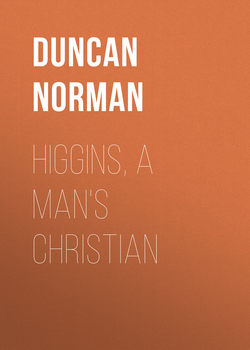Читать книгу Higgins, a Man's Christian - Duncan Norman - Страница 4
IV
THE CLOTH IN QUEER PLACES
ОглавлениеThis is the simple and veracious narrative of the singular ministerial activities of the Rev. Francis Edmund Higgins, a Presbyterian, who regularly ministers, without a church, acting under the Board of Home Missions, to the lumber-jacks of the remoter Minnesota woods. Singular ministerial activities these are, truly, appealing alike to those who believe in God and to such as may deny Him. They are particularly robust. When we walked from Camp Two to Camp Four of a midwinter day, with the snow crackling underfoot and the last sunset light glowing like heavenly fire beyond the great green pines–
“Boys,” said Higgins, gravely, “there’s just one thing that I regret; and if I had to prepare for the ministry over again, I wouldn’t make the same mistake: I ought to have taken boxing lessons.”
No other minister of the gospel, possibly, could with perfect propriety, in the sight of the unrighteous, who are the most severe critics of propriety in this respect, lean easily over a bar (his right foot having of long habit found the rail), and in terms of soundest common sense reasonably urge upon the man behind the wet mahogany the shame of his situation and the virtue of abandoning it; nor could any other whom I know truculently crowd into the howling, brawling, drunken throng of lumber-jacks, all gone mad of adulterated liquor, and with any confident show of authority command the departure of some weakling who had followed the debauch of his mates far beyond his little strength.
“Come out o’ this!” says Higgins.
“Ah, go chase yerself, Pilot!” is the indulgent response, most amiably delivered, with a loose, kind smile.
“Come on!” says Higgins, in wrath.
“Ah, Pilot,” the youngster pleads, “I’m on’y havin’ a little fun. You go chase yerself, Pilot,” says he, affectionately, with no offence whatsoever, “an’ le’ me alone.”
The Rev. Francis Edmund Higgins, in the midst of an unholy up-roar–the visible manifestation, this environment and behavior, it seems to me, of the noise and smell and very abandonment of hell–is privileged to seize the youngster by the throat and in no unnecessarily gentle way to jerk him into the clean, frosty air of the winter night. In these days of his ministry, nobody–the situation being an ordinary one–would interfere. If, however, it seemed unwise to proceed in this way, Higgins would at least strip the boy of his savings.
“Hand over!” says he.
The boy hands over every cent he possesses. If Higgins suspects, he will turn out the pockets. And later–late in the night–with the wintry dawn breaking, it may be–the sleepless Pilot carries the boy off on his back to such saving care as he may be able to exercise. To a gentle care–a soft, tender solicitude, all separate from the wild doings of the bar-room, and all under cover, even as between the boy and the Pilot. I have been secretly told that the good Pilot is at such times like a brooding mother to the lusty, wayward youngsters of the camps, who, in their prodigality, do but manfully emulate the most manly behavior of which they are aware.
To confuse Higgins with cranks and freaks would be most injuriously to wrong him. He is not an eccentric; his hair is cropped, his finger nails are clean, there is a commanding achievement behind him, he has manners, a mind variously interested, as the polite world demands. Nor is he a fanatic; he would spit cant from his mouth in disgust if ever it chanced within. He is a reasonable and highly efficient worker–a man dealing with active problems in an intelligent and thoroughly practical way; and he is as self-respecting and respected in his peculiar field as any pulpit parson of the cities–and as sane as an engineer. He is a big, jovial, rotund, rosy-cheeked Irish-Canadian (pugnacious upon occasion), with a boy’s smile and eyes and laugh, with a hearty voice and way, with a head held high, with a man’s clean, confident soul gazing frankly from unwavering eyes: five foot nine and two hundred pounds to him (which allows for a little rippling fat). He is big of body and heart and faith and outlook and charity and inspiration and belief in the work of his hands; and his life is lived joyously–notwithstanding the dirty work of it–though deprived of the common delights of life. He has no church: he straps a pack on his back and tramps the logging-roads from camp to camp, whatever the weather–twelve miles in a blizzard at forty below–and preaches every day–and twice and three times a day–in the bunk-houses; and he buries the boys–and marries them to the kind of women they know–and scolds and beseeches and thrashes them, and banks for them.
God knows what they would do without Higgins! He is as necessary to them now–as much sought in trouble and as heartily regarded–as a Presbyterian minister of the old school; he is as close and helpful and dogmatic in intimate affairs.
“Pilot,” said Ol’ Man Johnson, “take this here stuff away from me!”
The Sky Pilot rose astounded. Ol’ Man Johnson, in the beginnings of his spree in town–half a dozen potations–was frantically emptying his pockets of gold (some hundreds of dollars) on the preacher’s bed in the room above the saloon; and he blubbered like a baby while he threw the coins from him.
“Keep it away from me!” Ol’ Man Johnson wept, drawing back from the money with a gesture of terror. “For Christ’s sake, Pilot!–keep it away from me!”
The Pilot understood.
“If you don’t,” cried Ol’ Man Johnson, “it’ll kill me!”
Higgins sent a draft for the money to Ol’ Man Johnson when Ol’ Man Johnson got safely home to his wife in Wisconsin. Another spree in town would surely have killed Ol’ Man Johnson.
